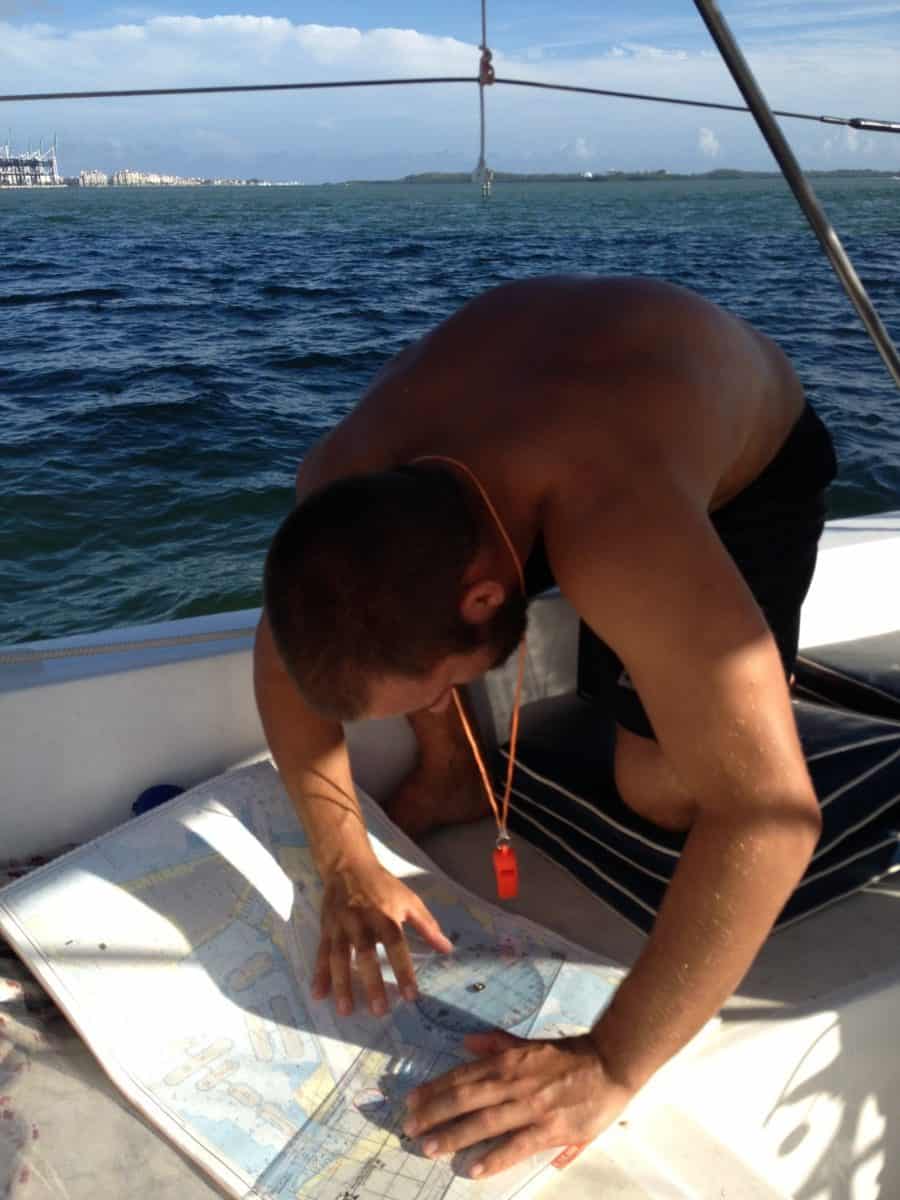As an Amazon Associate, we earn from qualifying purchases. We may also earn commissions if you purchase products from other retailers after clicking on a link from our site.
Being a liveaboard on a catamaran sounds grand, exotic, and exciting. While this may be so, there are also practicalities you need to deal with. What struck me a few weeks into my adventure was the amount of work that needed to be done and how complicated some of the everyday tasks such as cleaning could be.
To live aboard a catamaran, you need to maintain high hygiene standards, keep the boat clean, learn to conserve water and keep track of your provisions. Also, you need to know how to be well organized, create your personal space and adapt to living in close quarters with nature.
Living on a catamaran is fun, but it also has its share of challenges. This guide will provide you with all the information you need, plus helpful tips and tricks to make your stay more enjoyable and comfortable. Let’s dive right in, shall we?
Maintain Your Hygiene on Board
To enjoy your time while living on a boat, it is essential to maintain your personal hygiene. Good hygiene and grooming promote good health, help keep infections and foul odors at bay, and contribute to a positive self-image. Basic hygiene entails washing hands, taking baths, and wearing clean attire.
This is everyday common sense on land but on a boat, hygiene becomes a little trickier especially since freshwater comes at a premium. I recommend getting washing detergent that is compatible with salt water, this will save you a lot of water that can instead be used for cooking or drinking.

Cook Aboard Your Catamaran
Cooking delicious meals on a catamaran is fun. But it can also be challenging due to the limited space and the constant need to conserve water and cooking gas. Other factors that affect cooking aboard a catamaran boat include ventilation, access to cooking ingredients, and water supplies. Let’s look at some of these areas.
Limited kitchen space impacts your food prepping. This may require you to get creative and adjust your recipes to work with what you have or learn how to clean up as you work. Also, be selective when buying galley equipment and go for high-quality multi-purpose cookware that is durable, easy to clean, and helps conserve power.
Fresh water is a premium commodity when you are underway, so be careful how you use it. To conserve your water, try cooking one-pot meals and use minimal water for cooking pasta. And if possible use the hot water from cooking to do the dishes.
Here are additional tips on how to make the most of your catamaran kitchen:
- To maximize your storage, only keep essential items in the fridge, such as foods that require refrigeration once opened.
- Ditch plastic bags, paper towels, and single-use items and use plastic containers instead. This helps save space and money.
- Include a wide range of vegetables in your provisions, such as canned, dehydrated, frozen, and fresh. This helps to stretch your fresh food as you can use a little bit of everything when cooking. Pro-tip; buy fruits and veggies that are not ripe but will ripen a week or two into your trip, just put the fruit in sunlight and eat them as they ripen!
- Stocking up on dry and canned foods will help limit your occasional grocery runs to fresh food shopping.
- To add flavor to your meals, consider potting some herbs in a corner of your cockpit.
- Prepping veggies like cabbage, broccoli, and cauliflower immediately after buying them saves additional space. Save scraps in your freezer for making vegetable soup.
What meats does not need refrigeration and how long will they last?
Keep Your Boat Clean
Cleaning the Surfaces
Keeping your boat clean can take a lot of time and effort. To make your work easier and eliminate the need to use a lot of water, use a mixture of water and vinegar. This solution is ideal for general onboard cleaning and appropriate for use on most of your surfaces. It also helps limit the number of cleaning products in use and prevents the use of harsh chemicals.
Simply spray the areas, then use a rag to wipe down the surfaces. For the interior, use microfiber towels, as they are less likely to scratch glossy surfaces.
Watch the below video for more information on the kind of tools you need to clean your boat:
Cleaning the Hulls
To optimize your catamaran’s performance, it’s advisable to clean your hulls every 4 to12 weeks. This is important as regular cleaning helps to prevent fouling. That said, the cleaning frequency will depend on factors such as your geographical location, usage levels, water temperature, and salinity.
Catamarans offer many ingenious ways of maintaining your boat; one such way is something called beaching, where you run the boat up to the beach and wait for the tide to leave the boat stranded with full access to the hulls.
Mold Prevention
Living in a boat is a little different from living in a house. Moisture from cooking and washing could get trapped in the cabin, thus forming an excellent environment for mold to grow. And because there are few vents, steam collects on the surfaces too. As a result, you will need to wash and dry your cupboards every other month to keep mold away. And build a habit of keeping the lid on pots when you cook.
Also, ensure to keep the boat warm and dry and allow for plenty of ventilation. If you have a galley-up catamaran, opening the cockpit window can help release both heat and steam.
As for boat odors, use charcoal briquettes placed in small plastic containers placed throughout the boat. Make small holes in the containers, allowing the briquettes to absorb the odors.
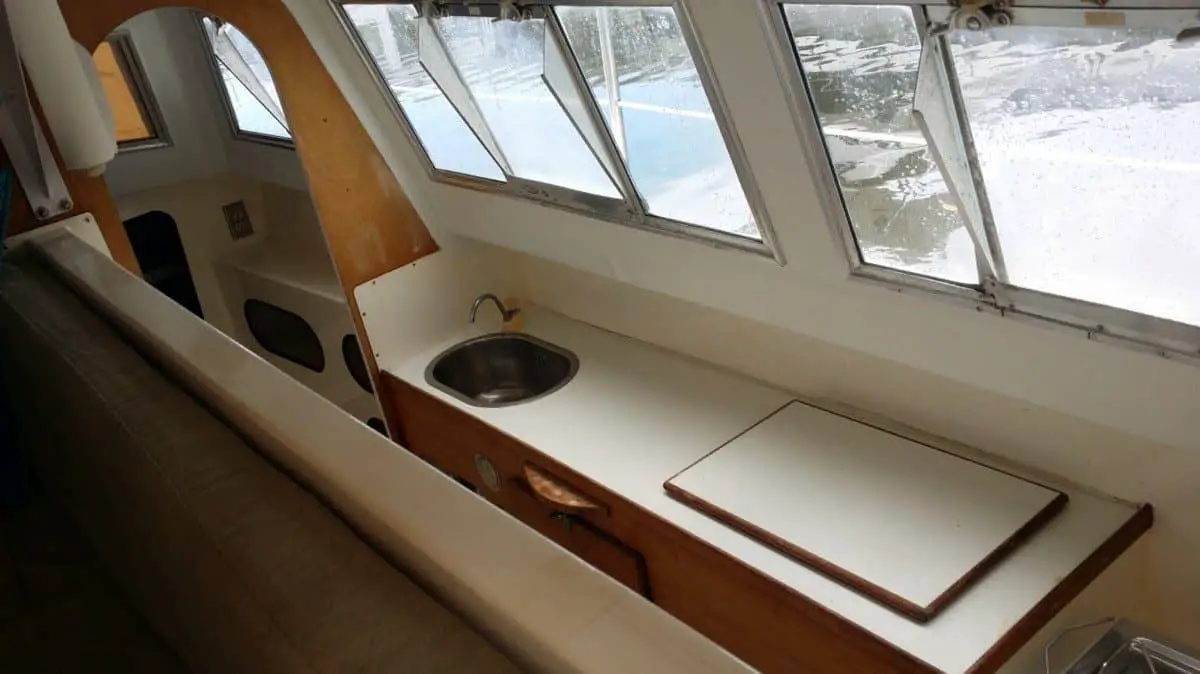
Keep the Catamaran Neat and Tidy
It is crucial to store clothes, food, and personal items neatly to protect them from mold, leaks, and bugs. For additional protection, use essential oils, bay leaves, or vinegar. You can also place some items in plastic bags..
Take advantage of the ample storage space in your catamaran to ensure that everything is carefully tucked away – and put where they are most accessible. This includes all tools and equipment. Proper storage will not only keep the boat tidy but also enhances your safety, especially during rough weather when things tend to fly off the shelves.
Keep Track of Your Provisions
To avoid running out of stuff unexpectedly, always keep an eye on your provisions as well as resources like water, gas, and electricity. If not, your supplies might run out when you are too far from a marina. Make a point of checking your stocks regularly and again before heading out sailing. It’s also a good idea to have extra essential supplies, like water.
Being organized can help you keep a tab on your provisions. Have a list of your inventory and update it every time you use something. For this purpose, you can stick dry erase boards to the inside of your cupboards.
Also make sure you seperate the vitals so if something goes bad or was stored in a improper way, there are food in other places.
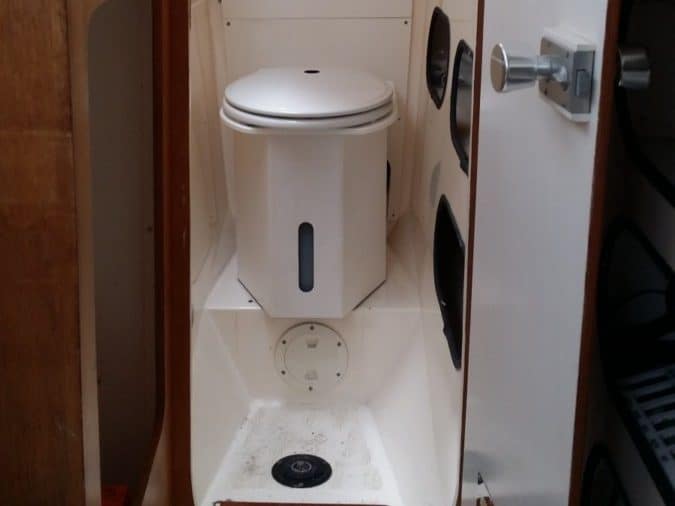
Conserve Your Water
Conserving water on your catamaran can be a challenge, but it’s crucial to do so. As such, you need to find ways to save water so that you can have enough for showering, washing dishes, and toilet use. This entails adjusting your water usage so as to stretch your water supplies.
You may choose to base your water conservation efforts on your boat size, water carrying capacity, and whether you have a watermaker. However, you will find that even small changes will make a noticeable difference in your overall water consumption.
The activities that consume the highest amounts of water in a catamaran are boat cleaning, showering, washing dishes, and laundry. And if you can manage to use less water when performing these activities, you can stay off-grid longer, anchored in scenic and enjoyable locations.
This is important even if you have a water maker, using less water means less stress on the machine and lower risk of the watermaker breaking in the middle of nowhere.
Here are tips and tricks to help push your water supplies further:
- Take shorter showers.
- Take a bath in the ocean or a sponge bath.
- Use a hand sanitizer to keep your hands clean.
- Place a tub in your kitchen sink for use when washing dishes.
- Wash your dishes in saltwater first, then rinse off with fresh water- sanitize with bleach first to prevent exposure to harmful microbes.
- Use minimal amounts of detergents when doing your laundry.
- Save bulky clothes like bedsheets and towels for the marina or when you can access a washing machine.
- Find creative ways to repurpose your water, such as using melted ice water to make more ice.
- Place a basin under your shower to collect used rinse water – you can then use it to flush the toilet.
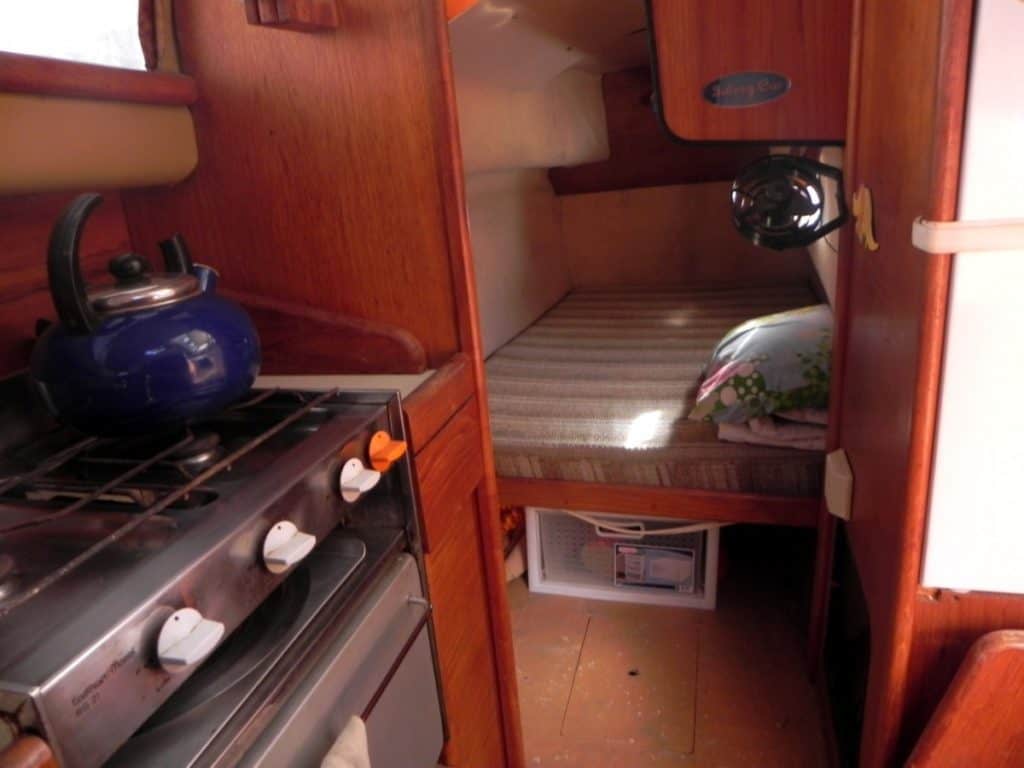
Minimize How Often You Do Your Laundry
Back on land, it’s easy to throw your clothes in the laundry basket after one wear, not so in a boat. Besides being somewhat inconvenient to do your laundry here, it also consumes a lot of your precious water.
To minimize how often you do your laundry, consider what to wear and how to wear it. For instance:
- During summer: Due to the heat, it is more comfortable to wear leggings or swimsuits. Furthermore, these quick-drying clothes are easy to handwash in a little water. Also, try and stretch the life of your outerwear, and only clean your undergarments and swimwear in a small tub.
- During winter: It is easier to rewind your clothes during the cooler months. Avoid washing your clothes if they aren’t that dirty or smelly. Doing so not only reduces your laundry but also helps your clothes to last longer.
One of the advantages of living in a boat is that it allows you to simplify your life. With limited space, you only get to keep what you need. Take advantage of that and lessen your laundry burden by paring down your wardrobe. Only retain the items that are suitable for living on the water. Not only will it be easier to get dressed and clean up, but it will also save on your storage space.
Be the Handy Sort
Sailing boats need a lot of work. And much of it involves fixing, maintaining, and repairing one thing or the other. And it doesn’t help that catamarans have two sets of engines, hulls, and rudders, as this means double maintenance work. Needless to say, mechanical know-how is a vital sailing skill.
If you have a way around machines or enjoy DIY projects, it can help you save thousands of dollars since you can do the plumbing or fix electricals. The alternative is having a professional fix every issue on your boat, which can be expensive.
Don’t forget to keep a couple of tools and spare parts. This is important as it might be challenging to get some parts if you wait to buy them when you need them most. Besides, with two engines, you will need to stock up on double spares.
Invest in Your Boat’s Security
Just like your home, your boat needs to be safe and secure at all times. To this effect, consider installing smoke alarms, a propane sniffer, and keep a fire extinguisher handy. You may also want to do the following:
- Check out details on local weather and the latest alerts, and avoid heading out if conditions are not stable.
- Invest in a high-quality security camera and position it on the main entry to deter any intruders or unwanted visitors.
- Keep your valuables locked away in a safe place when away from the boat – this includes phones, laptops, GPS equipment, radios, etc.
- Bring in your dinghy every night instead of leaving it tied to your boat.
- To prevent theft of your catamaran, install an alarm system with motion sensor lights.
- Avoid leaving your keys in the boat while at anchor.
- Be selective when choosing your marina, and always go for one that has full-time security and good lighting.
- When you park your boat, ensure it’s not easy to move as this makes it more difficult to steal – don’t leave it on the trailer.
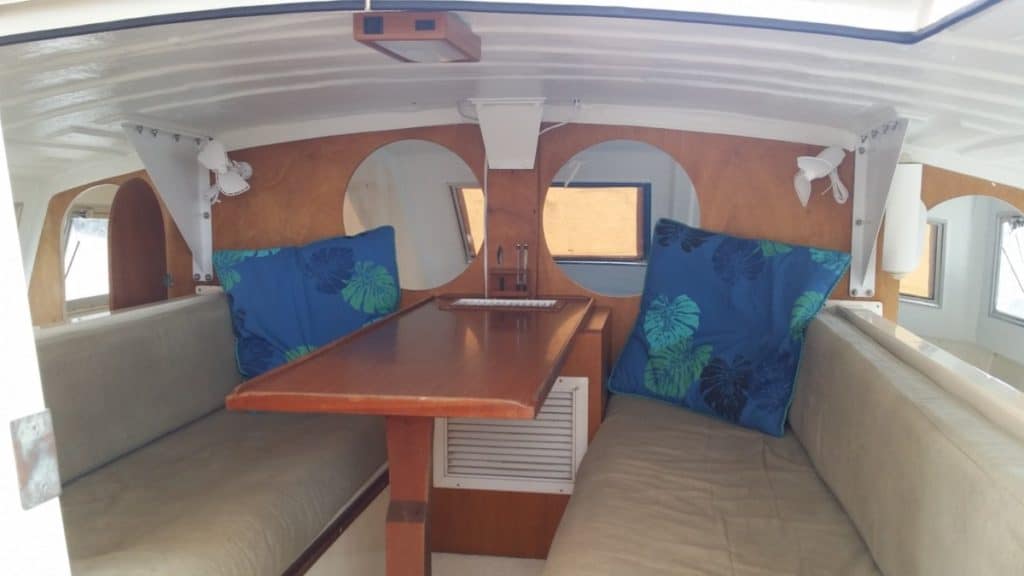
Get Used to Limited Space
Catamarans are spacious vessels that provide ample living space for liveaboards and their families of friends. That said, you still won’t have as much space as you have in your home, so you need to be selective about what stuff to bring in. In addition, you’ll have limited personal space, so you will need to learn to get along with your partner or family members.
This also means showing respect to your crew, giving them the space they need when they need it! I believe this to be the difference between a great adventure and a painful time.

Spend More Time at Anchor
Living on a catamaran legally in a marina is sometimes forbidden. While marina fees are double the cost of a regular monohull, most marinas have long waitlists for liveaboard slips. Plus, some might only allow you to spend a couple of nights every week.
Consider anchoring out instead. Anchoring will enable you to enjoy beautiful evenings at peaceful anchorages. You could watch the sunset, sip on wine or beer, listen to music or play cards under the gentle rocking of your catamaran.
Anchoring is legal and free though you may need to move your catamaran every few days or so depending on local rules and regulations.
Control the Boat Temperature
You might not have that much control over boat temperature while at anchor, but when sailing, there is something you can do about it. During hot days, get a cross-breeze by keeping the doors and hatches on your bridgedeck open.
During chilly nights, a catamaran can get very cold. This is because it cools down pretty fast since it lacks insulation. Cover up with down blankets, warm clothing, and, if necessary, foul weather gear. This will help you keep the cold at bay.
Of Course there is the possibility of installing both heaters and AC, but this adds complexity and the need for repairs.
Create Space for Your Personal Time
If you are a family of liveaboards or a couple, living together in a confirmed space can be trying at times, even in a big and spacious catamaran. Doing everything together, including eating, sleeping, and taking care of the boat can be lots of fun, but you also need to have some time to do your own thing.
The good thing is that with a catamaran, there’s enough room to create your personal space. You have the option of using the cockpit, salon, trampoline, or even the owners’ berth. Make these spaces comfortable and welcoming enough to allow you to have a special space in your floating home. While in your preferred space, you can also indulge in your favorite pastimes like reading, painting, or cooking.
While at anchor, you can also take the opportunity to engage in solo adventures like kayaking, deep diving, or swimming.
Learn To Appreciate Nature
Living on a catamaran can be very rewarding. The lifestyle allows you to slow down, move at your own pace, and embrace the present moment. It also allows you to have a deeper connection with nature. So learn to take the time to appreciate every beautiful moment; the sun bouncing off the waves, the ocean sounds, birds on their morning routine, and sea turtles lazing by.
This might be a little hard in the beginning, but once you settle in to living with nature, something changes and for the first time in your life you wont be looking at your clock every other second!
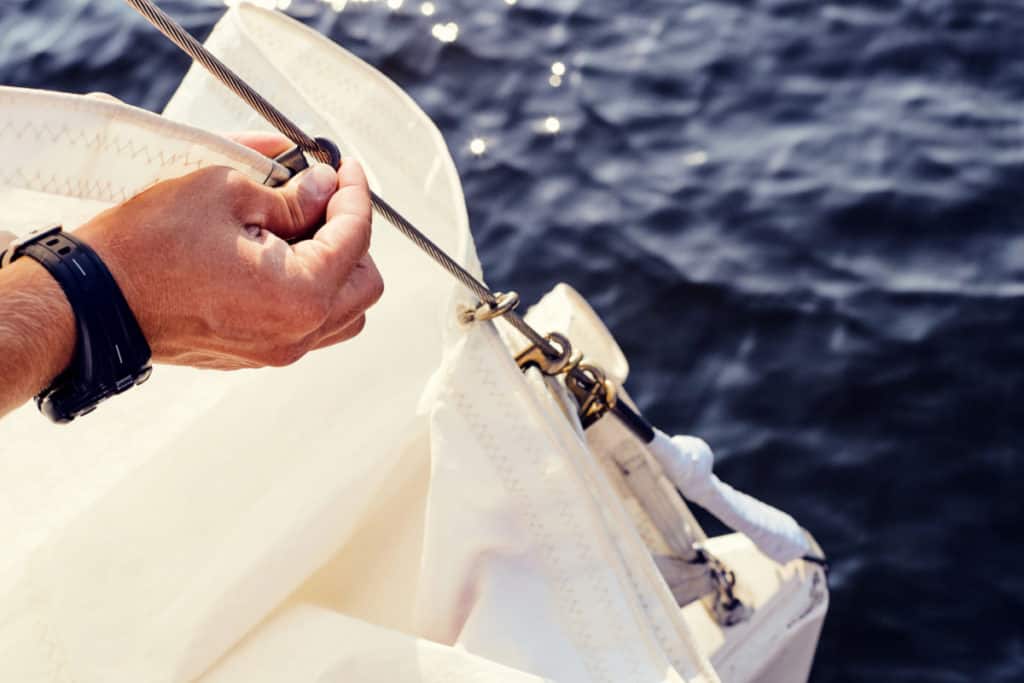
Enroll for Sailing Classes
Finally, if you are new to sailing or need to refresh your skills, it’s advisable to take sailing lessons before moving into your catamaran. This will teach you the basics about sailing a catamaran. It will also increase your confidence levels if you haven’t sailed in a while. In the US, sailing classes are mainly offered by two companies, US Sail vs ASA Sailing.
There are many options to learn how to sail a catamaran, check out this list to get some ideas that could save you money and time!
Final Words
If you have been thinking about living on a catamaran, I hope this guide has you fully convinced to go ahead. This amazing lifestyle will not only take you to destinations you had only dreamed about previously, but it will also get you up close and personal with nature.
You will learn to enjoy simple pleasures like sunsets and sunrises and improve your sailing skills as you get to know your boat better. Living on a catamaran also gives you a unique opportunity to form stronger bonds with your family or partner. And the best part? Creating incredible memories.

